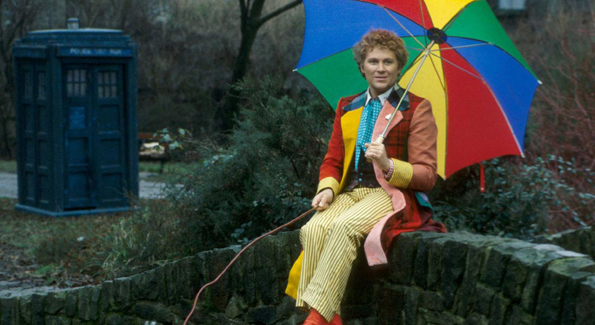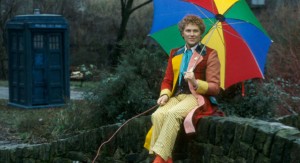“Change my dear. And it seems not a moment too soon.”
The year is 1984. Orwell’s vision is a tiny bit more accurate than Spectrum game designers would admit, Van Halen recorded the best album with a smoking baby on it ever, and humble heart throb Peter Davidson had finally revealed the meaning behind that weird piece of celery on his lapel. The consequences, of course, were fatal and so after one of the most shameless death scenes in the series, Doctor number five became the blond afroed snarky sixth doctor in Nicola Bryant’s arms.
Little did we know how almost fatal that was too.
The Sixth Doctor, thanks to the oddities of the John Nathan Turner regime of the show, budget cuts, policy and management changes at the BBC as well as some other changes led to the Sixth Doctor becoming an immensely controversial and polarising doctor. A lot of people dismiss him immediately, mostly for this.
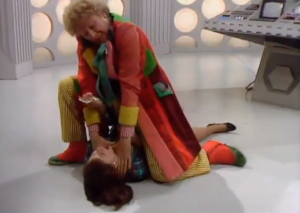
However, despite this, or perhaps because of the interestingly tumultuous facets of his time in the TARDIS, Colin Baker and the Sixth Doctor does have a charm past the violence, the dodgy patriarchal morals and some absolutely rubbish serials.
And you of course are coming along for the journey through space and time as well!
By 1984, the John Nathan Turner era had been in full swing, with an emphasis on more science based plots, complex timelines, more question marks than the Riddler and casting people from the TV-AM sofa and to appeal to foreign markets. Like it or not, this was his way. Peter Davidson indeed didn’t like it and so left the series. JNT, in his usual trend of casting a complete opposite doctor from the last, cast Colin Baker, an older actor who had worked on both Doctor Who and Blake’s 7 before. Gone were the cricket jumpers and dapper jackets, and in comes a full on patchwork and rainbow motif. People didn’t like that. Also gone was the Doctor’s very soft heart and sentimental streak, replaced by a doctor that was belligerent at best and outright psychotic at worst. People didn’t like that either.
Part of the problem of course was his debut, the last serial of 1984, The Twin Dilemma, which was far and away the worst Doctor Who serial made in the original run (So other contenders like Dimensions in Time and The Movie don’t count). The plot was sluggish and went nowhere, it looked absolutely cheap even for Doctor Who, took place in about four rooms total and the acting across the board was pretty atrocious. All of these are bad, but what was worse was the Doctor himself, who became psychopathic after the regeneration, and attacked companion Peri Brown in the absolute nadir of the original series. It naturally got complaints and people tuned out in droves, the Doctor being a lead weighted off-taste joke wrapped in kitsch.
The sad thing is this all kind of got worse with the next series in early 1985. The show was rescheduled for about the fourth time in as many years, back to the traditional teatime Saturday slot. The problem was the format had abruptly changed, making the show 45 minutes long. This, like bringing in Nicola Bryant and having her play a scantily clad American tourist was another JNT attempt to get in on the American market. Peri was not popular with the fans, and the fact that a good seven-eighths of the series were devoted to Peri and the Sixth Doctor bickering like an old married couple likely didn’t help matters. This was meant to be funny, but instead came off as either outright insufferable or a little bit patriarchal. (Incidentally, Colin Baker and Nicola Bryant went on to star in a bunch of really cheap BBV straight to video films, including one that gave the pair the dubious honour of being the first Doctor/Companion partnership to star in a love scene together.)
Besides the inordinate time devoted to the Doctor’s mental state and Peri whining about pretty much everything there were the serials themselves, and my word does the classic format not work in 45 minutes. Unlike the modern series, which figured out that the only way to do the American format is to script the show in the same three-act structure that they use, this series films a standard four parter and clumsily edits it to try and create some form of cliff hanger between parts one and two. The result is an absolute pacing nightmare, sagging painfully around the middle more than Baker himself. Attack of the Cybermen, the first serial of the series is hit by this the absolute worst, spoiling what would have ordinarily been a rather good story with pointless meandering and subplots that take too long to get going and don’t have long enough to conclude.
Pretty much every serial had something that managed to get up the nose of fans, staff or people on points of view alike. Vengeance on Varos, probably the strongest serial of the series was absolutely inundated with this, precisely for the same reasons it was good. It was a dark, Orwellian tale of a dystopian totalitaria where torture is entertainment and the viewers get to choose who lives and who dies. Much like I’m a Celebrity then, except it’s not as painful on the viewer. All while this is happening, a disgusting snail-like swindler by the name of Sil is negotiating ore prices while the planet suffers. The result of which is subversive, unnerving, claustrophobic and actually very compelling TV. By the law of Doctor Who of course, this means that it got absolutely lambasted in the popular press for being a tawdry violent spectacle, something it was too clever and too politically minded to be. It reflected a culture where private interests led to the most despicable acts being performed in the name of the people, a people placated by the sight of torture and brutality and numb to the idea of revolution. This would work better if the supposed moral centre of the tale wasn’t killing people with one liners even James Bond would think better of.
That said, in terms of ham fisted as that was, it had nothing on The Two Doctors, a vegetarian screed that ironically enough was so ham-fistedly unsubtle as to be laughable. In this, Patrick Troughton’s Second Doctor is kidnapped and it is up to Peri, Jamie and the Sixth Doctor to go to a Spanish villa (for some reason) and rescue him from the overly-ambitious Dastari, and his Androgum creation Chessene, who seeks to steal the ability to time travel. Flanking them as well are Shockeye, the androgum cook (geddit? It’s an anagram for “gourmand”!) and a strike force of Sontarans who suffer from the worst facial movements since the Junior Christian Science Bible Hour.
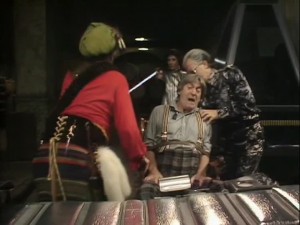
The simple problem with it was that it was three episodes long, and two of the episodes basically ended up being repeats of each other, with Peri and the Second Doctor getting kidnapped at a rate Princess Peach could only dream of. It wasn’t terrible, but just as you started to enjoy its silliness it whacks you in the face with a spinning leek of lectures.
Still, being interestingly bad was much better than being The Mark of the Rani, which was pretty much entirely composed of bickering and nothing else. If it wasn’t the Doctor and Peri arguing, then it was the Master and new time lady character the Rani bickering about whether her plan is too mundane or not. All this is draped around George Stevenson and the Luddites revolt in a way that looks less like a hearkening back to more historical episodes and more an excuse to use more quarries.
In the middle of this series, we would be remiss not to talk about A Fix with Sontarans, when the Doctor takes on a great nemesis of modern times – Jimmy Saville. Yewtree aside, this was a short little serial at some random unspecified Peri-less point, where the Doctor accidentally enlists the help of both former companion Tegan and future head of Save the Children Gareth Jenkins aged 8 to take on a couple of wily Sontarans. It’s clearly not canon, but it shows the better side of this incarnation, his sly wit mixed with a genuine care and compassion.
All in all the series wasn’t completely without merit, with some great serials here and there, and the ratings, contrary to popular belief, were not actually that terrible. The problem was that the louder parts of the audience, the popular press and the new management at the BBC didn’t quite see it that way. Around the time the series aired a new Director General took office, Michael Grade. Grade is a very controversial figure, not just among Doctor Who fans, but suffice to say he did not like the series, the way it worked, the budget it had and by some accounts Colin Baker himself and so put the show on an 18 month hiatus, all but cancelling it.
And then… this happened…
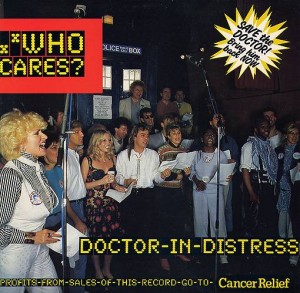
More on that in another article. Apparently daring not to risk a sequel to Doctor in Distress, Grade relented and gave the series 14 more episodes to prove its worth, which led to a series-long epic serial known as The Trial of a Time Lord. It is the longest single serial in the history of the series and is quite possibly one of the best of the original series, right up there with The Deadly Assassin and the Caves of Androzani. It kind of cheats on both counts though, being a frame narrative with four shorter stories within it (titled by fans as “The Mysterious Planet”, “Mindwarp”, “Terror of the Vervoids” and “The Ultimate Foe”) and so manages to create three great standalone serials and a frame narrative that links them all together rather well.
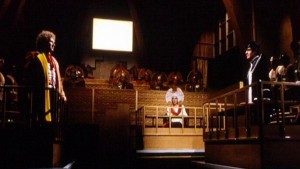
The Trial itself is of course echoing the criticisms and sentiments of the series itself, in ways that are probably closer than even the script writers intended, with the primary facets of the Sixth Doctor’s persona that people hated being used as a way to condemn him to death, the violence and callousness getting him indicted for murder and later genocide. To facilitate this, the Doctor himself is also somewhat changed and appears out of the Tardis at the start of the first story as a reformed, more caring and more heroic figure that bantered playfully with Peri rather than abrasively. The initial plan for the Doctor was that since Colin Baker wanted to do it for as long as they wanted him they could have the character be traumatised and psychologically damaged and then slowly build him on the path to becoming a hero but with the series on such thin ice they hadn’t the time for such slow-burning character development. This was likely for the better in any case, and fit the frame narrative’s tale of intrigue and tampered evidence down to a T. Baker’s acting is also superb, the courtroom drama allowing him to ham it up and chew scenery to a level that Phoenix Wright may never reach. It says something about his acting technique that during Mindwarp he almost made Brian Blessed sound subtle, and all tapers to a thrilling, epic conclusion that despite the absolutely chaos behind the scenes still provides a satisfactory conclusion and the potential for future stories.
Of course we would never see those stories. Doctor Who was saved by the skin of its teeth, getting another three years but on the condition that Colin Baker be fired. Given his frosty reception and the ways in which script editor and former right hand man of JNT Eric Saward among others talked about him it wasn’t exactly a surprise he got the axe, but the way in which it fell still seemed to be a bit in bad taste, given how Baker had done his best in the worst of situations and with the worst of creative choices. It looked after the final episode of series 23 that the Sixth Doctor had found his feet and had some potentially interesting adventures ahead, including the loose ends such as the origins of new companion Mel (played as controversially as everything else by Bonnie Langford).

Sadly, it was not to be.
The Sixth Doctor himself is love it or hate it, and for very good reasons. He was John Nathan Turner’s pick to be the Doctor and as such came with a lot of very JNTian quirks, which likely turned off as many people as it appealed to. It also didn’t help that the Sixth was saddled with some of the absolute worst scripts in science fiction, hampered by a very low budget and a Director General with absolute contempt for it. It is an interesting look at just how low a long running institution can go despite the best of intentions. That said, for the uninitiated The Trial of a Time Lord box set is a must have for Doctor Who fans, containing one of the best stories of that era along with a surprisingly candid hour long documentary on exactly what went wrong with Baker’s all too brief tenure. The Twin Dilemma is probably worth it too if you are a masochist, and while I have not heard any of them, the radio dramas Colin Baker did as the Sixth Doctor are apparently brilliant and in that format Baker is apparently at his best.
Colin Baker, after his rather abrupt and cruel sacking was asked to do the regeneration into the next Doctor. Baker refused, given that it made him unemployable for months, unless he could get the entire next series and regenerate at the end. That clearly would never happen, so the last we see of him is portrayed by Sylvester McCoy in a blond wig.
But that is a tale for another Time Lord.


